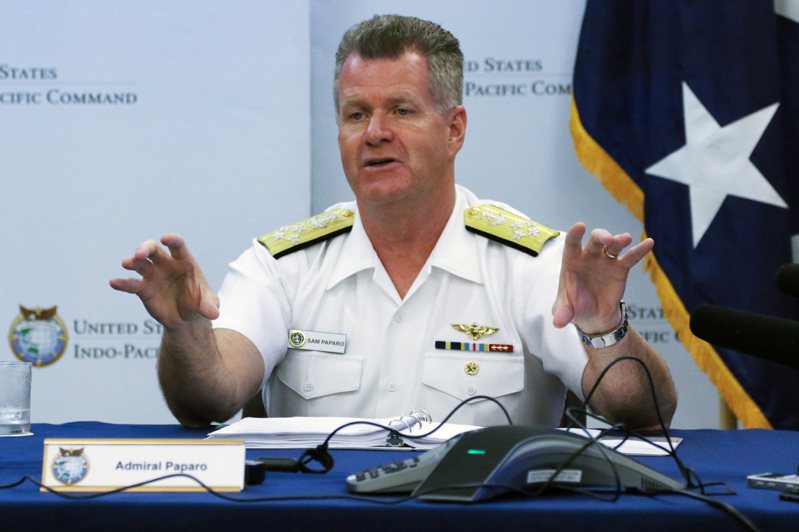2024-02-02 10:41 United Daily News reporter Zhang Wenxin/Washington Real-Time Reporting Papalo, who was nominated as the Indo-Pacific Commander, said that in accordance with the Taiwan Relations Act, the United States ensures that Taiwan has the ability to defend itself and obstructs…
Samuel Paparo (formerly translated as Paparo), the nominee for the US Indo-Pacific Commander, testified before the Senate Armed Services Committee on the 1st that in accordance with the Taiwan Relations Act, the United States ensures that Taiwan has the ability to defend itself and thwart aggression against Taiwan. The task is clear.
The term of Commander John Aquilino, commander of the US military in the Indo-Pacific, will expire this year. US President Biden nominated Pacific Fleet Commander Baparo as the next commander of the Indo-Pacific in July last year. The Senate Armed Services Committee held a confirmation hearing on the 1st.
Baparo promised to ensure that the Indo-Pacific Command’s actions are consistent with the priorities of the U.S. national security strategy, especially when China continues to increase its coercive behavior to deter the outbreak of conflict; he ensured that the United States has a superior position in maintaining stability, no matter today , tomorrow, next week, and for decades to come.
Baparo described China as an approaching challenge and the only U.S. competitor that has both the intention and the ability to reshape the international order in line with its authoritarian preferences.
The war between Russia and Ukraine has reached a stalemate, and the Biden administration’s additional budget to assist Ukraine is still stuck in Congress.
Baparo said that if the United States wants to maintain peace and stability in the Indo-Pacific region, one of the most important things it should do is to support Ukraine in its fight against Russia. Russia’s frustrated aggression has a deterrent effect in the Western Pacific, and is a deterrent for U.S. partners. Reassurance.
However, Baparo also said that when China looks at Russia’s war in Ukraine, it will not think it is difficult because of the current war situation; Beijing wants to implement a short-term and intense conflict to form an established fact, and China is strengthening its efforts in this regard. ability.
Many members of Congress raised issues related to Taiwan. Baparo reiterated the “One China” policy of the United States; he said that the Taiwan Relations Act, the three U.S.-China Joint Communiques and the Six Assurances have contributed a lot to the United States in the past 45 years. According to the Pentagon, The Taiwan Relations Act helps Taiwan have the ability to defend itself. The Taiwan Relations Act also stipulates that the Pentagon must be prepared to thwart aggression against Taiwan. The task is very clear.
Committee Chairman Jack Reed asked, to some extent, it is strategic ambiguity at the diplomatic and presidential levels, but from the perspective of Indo-Pacific Command, it is about preparing for all possible situations, including preparing for combat?
Paparro responded, “Yes, that’s clear and that’s the focus of the mission.”
Baparo quoted the late US President Dwight Eisenhower’s famous saying, “Plans are nothing planning is everything” to describe preparations for changes in the Taiwan Strait. He said , keep a plan at all times; the Taiwan Relations Act limits what the Department of Defense can do. If the president orders it, the U.S. military will make plans for all military operations.
Paparro’s statement is in line with the consistent position of US military generals; even though US President Biden has promised four times that he will use military force to defend Taiwan in the event of an invasion by China, Mark Milley, former chairman of the US Joint Chiefs of Staff, only said that the United States There are various highly classified contingency plans, and he will provide timely advice to the President and Defense Secretary Lloyd Austin.
In addition, Paparro mentioned that Taiwan’s strengthening of asymmetric combat power can not only increase the deterrent to China, but also reduce the operational risk that the United States may rush to aid Taiwan; he will emphasize that Taiwan must also work hard to improve self-defense and expand defense spending and the implementation of necessary military reforms.
Baparo said that he has seen Taiwan’s military increasingly focusing on improving its self-defense combat capabilities, Taiwan’s defense investments, and changes in operational concepts (more towards joint operations).
United States Taiwan Relations Act US Military Taiwan Strait
Further reading
#U.S #militarys #quasiIndoPacific #commander #mission #blocking #aggression #Taiwan #clear
2024-02-02 02:41:37
